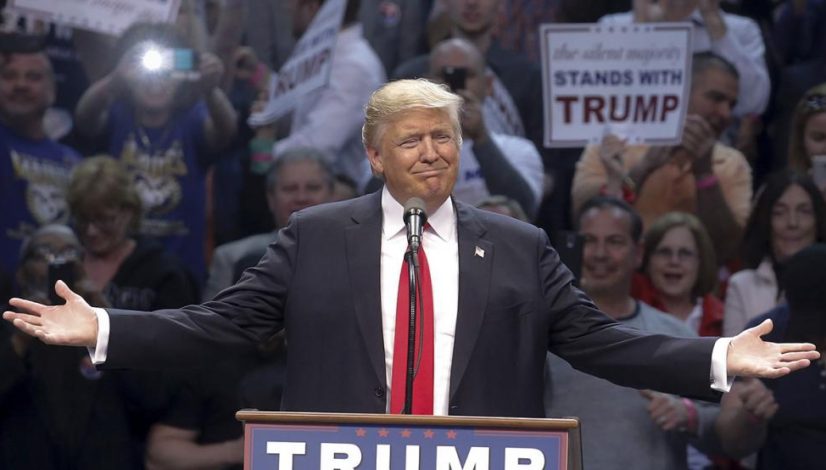Donald Trump Has Reason to Cry Foul Over a ‘Rigged Election’
Onto the next! The New York primary is in the rear-view mirror, but the scramble for Republican delegates is far from over. Next Tuesday, April 26, GOP primaries will take place in Pennsylvania, Connecticut, Delaware, Maryland and Rhode Island, with a total of 172 delegates up for grabs. Polls show Donald Trump leading by a wide margin in those states; he will likely have considerable momentum heading into Indiana on May 3. But wait — John Kasich has already claimed victory in Indiana.
An analysis by The New York Times of the remaining races suggests that winner-take-all Indiana could be pivotal. If Trump does not win the state, he might not secure the nomination outright before he reaches Cleveland. That makes the May 3 vote important. But, in Indiana and other states, it is becoming equally important to nail down delegates who will be released after the first ballot. That is what Kasich has done in Indiana, where he has evidently secured the second-round support of most of the state’s 57 delegates.
How can Indiana’s delegates commit to supporting Governor Kasich before a single vote has been cast in their state? Since there has been zero polling done in Indiana, delegates don’t even know who voters would like to nominate. Count this yet another primary season mystery. And, another reason for The Donald to cry foul.
If front-runner Trump does not arrive in Cleveland with 1,237 delegates in hand – the requisite majority needed to become the nominee – the convention will vote, and then vote again until one candidate reaches that magic number. After the first round, in which 5 percent of the delegates are “unbound,” 59 percent of the delegates are free to change their affiliation; after the second ballot, 80 percent can do so.
Voters should ask: how do you court a delegate? What can Ted Cruz, or any of the candidates, offer these men and women to secure their second-ballot votes?
For starters, he can pitch his policies, or the effort he will make on behalf of a delegate’s home-state candidates. He can argue that he has the best shot at beating Hillary Clinton, or that his polling in the candidate’s state looks great for the “down-ballot” crowd.
He might also offer to include a delegate in some policy-making committee, allow them to act as a campaign surrogate, or suggest that a person could fill a slot in the “transition team.”
Delegates can also be offered the all-important personal touch. Just sitting down to dinner with Ted Cruz or Donald Trump could dazzle some of the people headed to the convention. The Washington Post reported that during the 1976 election, President Ford wooed delegates via invitations to dine at the White House and at a July 4 party held on the deck of the USS Forrestal. That trumped Ronald Reagan’s counter-attack, which involved inviting delegates to meet Hollywood pals like John Wayne and Jimmy Stewart.
Will all of the above be enough? Maybe, but as the race tightens the candidates may have to throw a little more sauce on the steak.
In an obvious violation of ethical standards, it seems a candidate’s surrogates can also offer money or gifts to curry a delegate’s favor. For example, a candidate’s wealthy backer could offer to reimburse a delegate for his or her travel to the convention, and for their hotel stay in Cleveland. According to some sources, a person might even be treated to a jolly weekend ahead of the convention, in Mar-a-Lago for instance, to talk politics and strategy.
There are apparently no rules governing such outlays where ordinary citizens are concerned. There are laws that generally prohibit the buying of votes, but their application to the delegate selection process is unclear. If a delegate is a government official, there are anti-bribery statutes that apply. Also, there are laws that make gifts from corporations, labor organizations, foreign nationals or government contractors illegal. Some states have their own rules. For instance, in Ohio it is against the law to promise or give “money, office, position, place or employment, influence, or any other valuable consideration” to delegates at a convention.
Though the giving of perks and goodies might be protested, and lawsuits filed, the candidates know that the wheels of justice turn slowly. The convention will have come and gone by the time “Trump vs. Cruz Supporter” is actually heard in a court of law. Hence, there may not be legal recourse to thwart hanky-panky.
It is also true that no one will be the wiser. If a rich individual pays for a sight-seeing outing for a delegate en route to Cleveland, there is no requirement that such expenses be logged with the Federal Elections Commission or reported to the RNC. It’s just a gift from one person to another.
It should be noted that Trump’s campaign has sworn off doing “anything immoral, illegal or unethical,” according to senior advisor Barry Bennett. While making The Donald available is certainly on the table, “We’re not offering seats on the Trump airplane or anything like that,” he claimed. Hopefully all the campaigns follow suit, but there’s no way we will know.
Because this year’s nominating contest is so close, voters are much more attentive than usual to the process. From the ridiculously arcane rules governing the caucuses to Colorado where voters were left behind, Republicans can be forgiven if they are losing faith in the system and in the party. The last thing the GOP needs is a scandal about candidates “buying” delegates.
While the RNC rules committee meets this week in Florida, it is not too late to lay down some common-sense guidelines preventing such behavior. Given the passions and zeal of this year’s contests, getting ahead of this problem could be crucial.
Published here.



